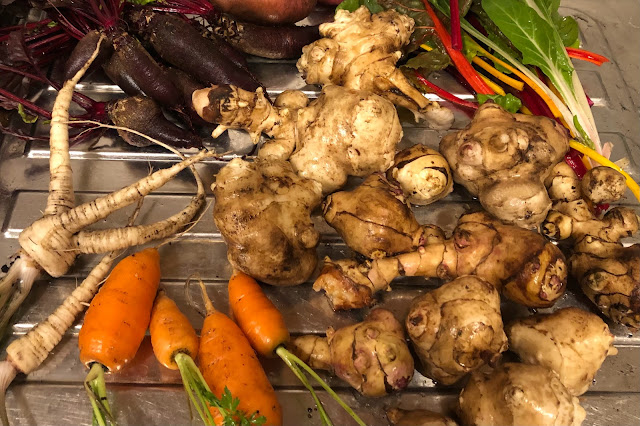 |
| Spot the real sunflower - most of these are Sunchokes (Helianthus tuberosus) |
My new discovery for the veg patch last year was Jerusalem Artichokes, also known as Sunchokes. I grew them for the sunflowers, little knowing of their many health benefits!
I'd resisted growing Jerusalem artichokes until the day they were served up as a side veg at a particularly posh restaurant meal that I was invited to attend. First tastes didn't provoke a eureka moment but that smooth blob of puréed sun-chokes piqued my curiosity. Was this a useful addition to the veg patch? And was their reputation for causing flatulence justified?
There were two important things that started my growing experiment:
One, the plants are in the same plant family as sunflowers; so it's a double win for the veg garden to get cheerful pollinator attracting sunflowers and, of course, those edible tubers after the flowers have faded. Plus seedheads in the autumn for birds to munch on. Triple win!
Secondly, I read that specialist tubers are not obligatory so I grabbed a bag of Jerusalem artichokes from the veg aisle in my local supermarket to start the experiment - and, even better, they were at sale price being at their 'best before' date.
 |
| Sunchoke leaves are less serrated than regular sunflower leaves. |
Growing them is easy:
I dug a foot wide shallow trench in a sunny corner of the veg patch, forked in some compost from my Hotbin (although any compost would do), buried the tubers about 4 inches deep, spaced them 8 inches apart, then covered them over again with soil. Job done. And then watered and waited. Probably longer than was necessary but the tubers can be left in the ground until needed. Just wait until the flowers have finished. So simple.
They didn't need earthing up like potatoes, they didn't need staking like tall sunflowers - unless your site is very windy - plus they're fairly pest resistant. And each tuber planted produced around 10 to15 more which I have roasted, pureed and mashed. Deliciously nutty, but their gassy reputation is warranted in my case. Enough said.
But not to be put off by their wind producing side effects, this year I'm bordering the veg patch with an extended row of Jerusalem Artichokes. Why? because they have some very good health benefits.
 |
| Harvesting Jerusalem artichokes from October through to January! |
So let's talk health benefits ...
These tubers are allegedly a nutritional powerhouse. They're a good source of antioxidants which makes them gut-friendly and immune-boosting. They're also packed with fibre, iron, potassium and phosphorus. (Huh? I had to find out what phosphorus is in relation to the human body, rather than soil! It's a mineral that supports the formation of bones and teeth, repairs cells, normalises the heartbeat, kidney function and muscle contractions. So .. pretty important stuff.)
But what they're most famous for is their high inulin content. Inulin is a carbohydrate that acts as a prebiotic, feeding your good gut bacteria to keep your innards healthy. It's hard to digest so when it reaches the intestines, it feeds the gut bacteria which then produce methane gas ... yes, the source of their nickname, fartichokes.
That aside, Jerusalem artichokes are touted as a good substitute for potatoes being low carb, low sugar and full of fibre.
They're still a bit of a novelty for me and I now know to eat them as a treat rather than every day and certainly not in any great quantity as I could feel (and hear!) the effect they had on my intestines for a couple of days.
There is a way to lessen the gassiness ...
I've read that there are three ways to reduce the side effects of Jerusalem artichokes. The first is to gradually increase the amount eaten in order to get your body to adapt; the second is to boil the sliced tubers in lemon juice which turns the inulin into fructose thereby making them sweeter but less gassy. The third is to slice and pickle them, retaining the nutty flavour and crunch. Option 3 sounds interesting!
So, a potato substitute with health benefits and cheerful flowers ... will you give them a go this year?
A few of the ultra-delicious recipes I've tried!
If you're new to cooking Jerusalem artichokes, can I steer you in the direction of Riverford Organic Farmers website? Here you'll find not only a few of the recipes that inspired me but also some good advice on preparing the tubers if you watch the video in the first recipe listed below.
Roasted Jerusalem artichokes with mushrooms, rosemary and garlic - still my favourite
Jerusalem artichoke and bacon gratin - cheese, bacon, cream and sunchokes, delicious.
Jerusalem artichoke and leek soup - the perfect soup using available veg from the winter garden.
Happy munching!
And here's Charles Dowding showing how he grows his Jerusalem Artichokes:
